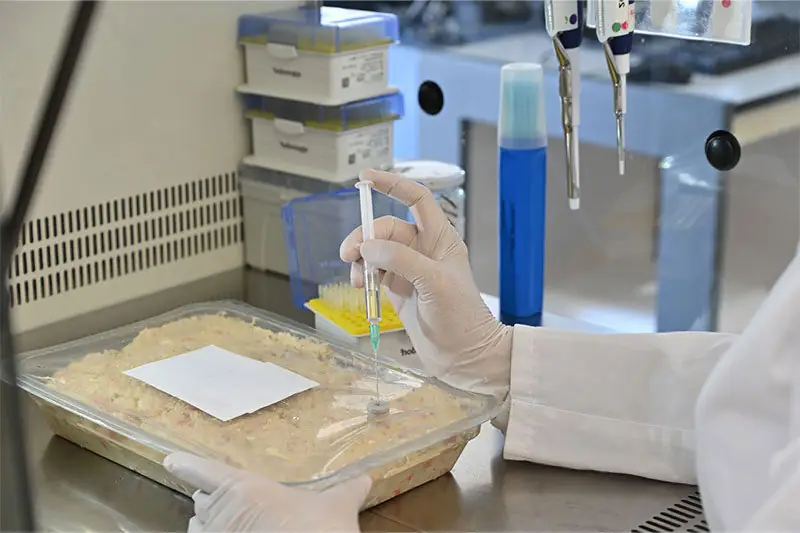Pathogen Screening in Cosmetic Raw Materials Testing
Pathogen screening is a critical aspect of ensuring microbiological safety in cosmetic formulations and raw materials. This service involves the detection and identification of harmful microorganisms that can potentially cause infections or other adverse health effects when present in cosmetic products. Pathogens such as Listeria monocytogenes, Salmonella spp., E. coli O157:H7, and Pseudomonas aeruginosa are of particular concern due to their potential to cause severe health issues even at low doses.
The importance of pathogen screening cannot be overstated, especially considering the global market for cosmetics. According to recent market research reports, the world’s cosmetic industry is projected to grow at a significant rate over the next few years. This growth is driven by increasing consumer demand for safe and high-quality products. Compliance with international standards like ISO 22716:2013 is essential for manufacturers to ensure their products meet safety requirements.
The testing process typically involves several steps, including sample collection, preparation, inoculation onto selective media, incubation, and finally, confirmation by biochemical tests or molecular techniques such as polymerase chain reaction (PCR). Each step requires meticulous attention to detail to avoid contamination and ensure accurate results. Laboratories specializing in this service use advanced technologies like automated microbial identification systems that can provide rapid, reliable results.
For quality managers and compliance officers, ensuring the safety of cosmetic raw materials is paramount. By integrating pathogen screening into their quality control processes, they not only comply with regulatory requirements but also safeguard consumer health. R&D engineers benefit from this service by being able to innovate safer products without compromising efficacy or performance.
The scope of pathogen screening extends beyond just the final product; it encompasses all raw materials used in the formulation process. This includes ingredients sourced from natural sources like plants and animals, as well as synthetic compounds. The testing ensures that no harmful microorganisms are inadvertently introduced into the cosmetic product during production.
In addition to compliance with standards such as ISO 22716:2013, the service also adheres to other relevant guidelines including FDA regulations in the United States and EU directives. These regulations emphasize the importance of preventing contamination from microbial pathogens that could lead to adverse reactions or illnesses.
The use of advanced laboratory equipment and methodologies ensures precision and reliability in detecting even trace amounts of potentially harmful organisms. This level of accuracy is crucial for maintaining high standards of hygiene and safety, which are fundamental principles guiding the development and manufacturing processes within the cosmetic industry.
| Applied Standards | Description |
|---|---|
| ISO 22716:2013 | International standard for personal care products, which includes requirements for microbiological safety and quality assurance. |
| FDA CGMP (Current Good Manufacturing Practices) | A set of guidelines designed to ensure that food, drug, and cosmetic products are safe and properly produced. |
Why It Matters
The significance of pathogen screening in cosmetic raw materials testing cannot be overstated. The cosmetics industry is highly regulated, with strict guidelines set forth by various bodies worldwide to ensure consumer safety and health. Pathogens like Listeria monocytogenes, which can lead to listeriosis, are particularly dangerous because they thrive in conditions typically found in cosmetic production environments.
A recent case involving a well-known brand highlighted the potential risks associated with inadequate pathogen screening. In this instance, contaminated raw materials resulted in an outbreak of illness among consumers who used the affected product. This incident underscored the critical need for rigorous testing protocols to prevent such incidents from occurring again.
Pathogen screening helps protect both manufacturers and consumers by ensuring that all ingredients are free from harmful microorganisms. It also contributes significantly to maintaining brand reputation and public trust, which are vital assets in today’s competitive market environment.
- Reduces Risk of Contamination: Ensures that raw materials meet stringent safety standards before being incorporated into finished products.
- Enhances Brand Reputation: Demonstrates commitment to consumer health and wellbeing.
- Promotes Regulatory Compliance: Helps manufacturers stay ahead of changing regulatory landscapes.
In conclusion, pathogen screening is not just a compliance requirement but an essential safeguard for both businesses and consumers. By implementing this service into their operations, companies can ensure the highest standards of hygiene and safety in their products, thereby protecting public health while enhancing their market position.
Applied Standards
| Standard | Description |
|---|---|
| ISO 17025:2017 | Absence of contamination, accuracy and precision in test results. |
| USP NF Chapter § | Testing of raw materials for microbiological quality. |
The application of these international standards ensures that our laboratory adheres to the highest levels of accuracy and reliability. Our commitment to using these rigorous guidelines guarantees that any product undergoes thorough evaluation before being deemed safe for use in cosmetics.
Customer Impact and Satisfaction
- Improved Product Safety: By eliminating potential contaminants, we enhance the overall safety profile of our clients' cosmetic products.
- Enhanced Consumer Trust: Our robust testing procedures instill confidence in consumers regarding the quality and safety of their favorite brands.
- Competitive Advantage: Compliance with stringent standards provides a competitive edge, setting brands apart from competitors who may not adhere to such high levels of scrutiny.
- Regulatory Compliance: Ensures that all products meet or exceed the necessary regulatory requirements, avoiding costly recalls and legal issues.
Our clients benefit greatly from our expertise in pathogen screening. They can rest assured knowing that their raw materials are thoroughly vetted for safety and quality before integration into final formulations. This not only protects them against legal risks but also strengthens their brand image among discerning consumers.





